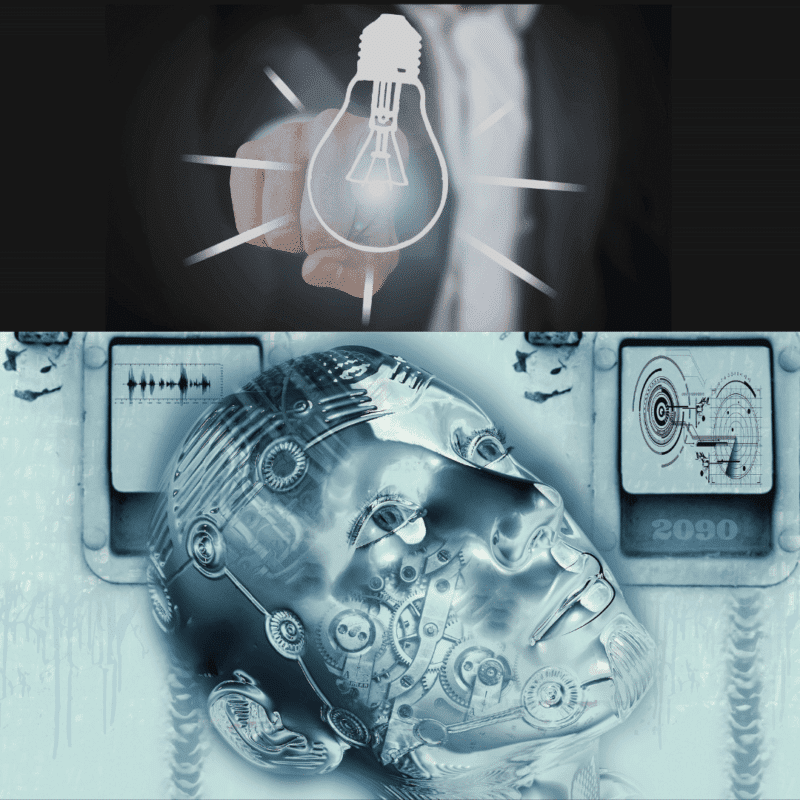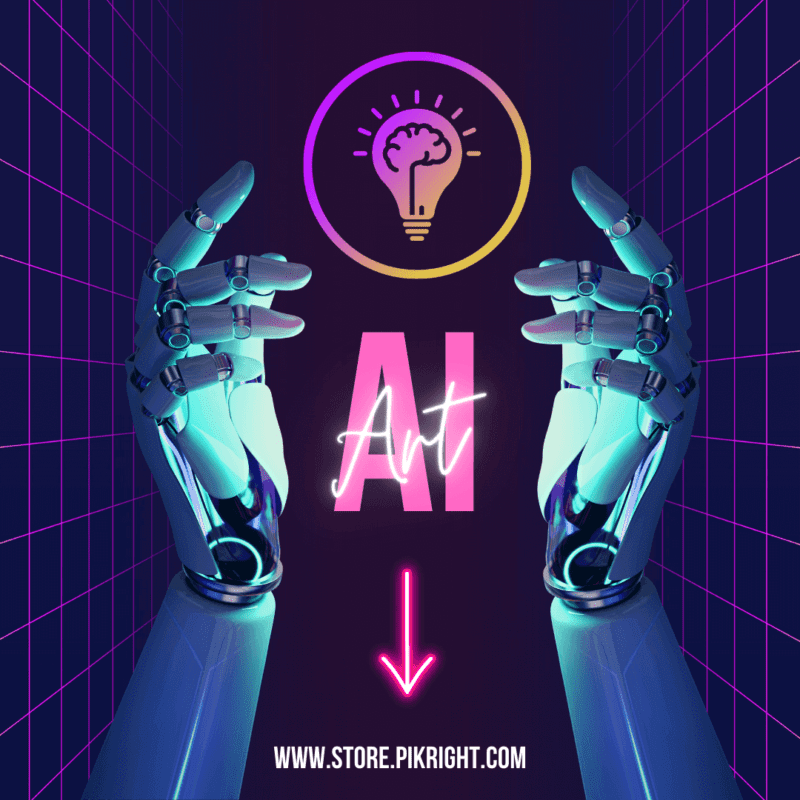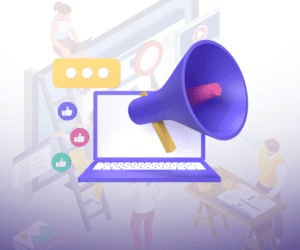Hey there! Are you familiar with robots and how they can do things that humans do? Well, artificial intelligence (AI) is like a really smart robot that can think and learn on its own. And artificial intelligence in digital marketing is when companies use the internet to advertise their products and services.
Did you know that AI is making a big impact on digital marketing? For example, AI can help companies show you ads for products you might be interested in based on your internet browsing history. It can also analyze data to help companies understand their customers better and make better decisions.
In this article, we’ll be talking about all the cool ways that AI is helping companies with their digital marketing strategies. We’ll also talk about some of the benefits of using Artificial Intelligence in digital marketing, and how it’s different from just using computers to do things. So let’s get started!
Table of Contents
Definition of artificial intelligence and digital marketing:
Artificial intelligence is a type of technology that allows computers to learn and do things that usually require human intelligence, like understanding language or recognizing images.
Digital marketing is a way of advertising and promoting products or services using digital channels, such as websites, social media, or search engines.
Explanation of how AI is transforming the digital marketing industry:
Artificial Intelligence is helping businesses to personalize their marketing messages and reach the right audience.
It can analyze data from different sources to provide insights into customer behavior and preferences.
AI-powered chatbots can interact with customers and answer their questions in real time.
Artificial Intelligence can also help with tasks like content creation, email marketing, and even product recommendations.
A brief overview of the topics to be covered in the article:
- The benefits of using Artificial Intelligence in digital marketing
- Examples of how companies are using Artificial Intelligence in their marketing strategies
- The difference between digitalization and artificial intelligence
- The future of Artificial Intelligence in digital marketing
- The impact of Artificial Intelligence on the job market in digital marketing

Imagine you’re trying to sell something to someone, like a toy or a book. You want to make sure you’re talking to the right person who might be interested in what you’re selling. That’s what digital marketing is – using the internet to find people who might want to buy something from you.
Artificial intelligence is like a super-smart computer that can help digital marketers do their job even better. It can help them find out more about the people who might want to buy something, like what they like and what they don’t like. It can even help make ads or messages that are personalized just for that person!
By using artificial intelligence, digital marketers can create better ads and messages that make people more interested in buying something. It can help them save time and money by making sure they’re showing their ads to the right people. In the future, we’ll probably see even more amazing things that AI can do to help with digital marketing!
Benefits of Artificial Intelligence in Digital Marketing
Artificial Intelligence (AI) is a type of technology that allows machines to learn and think like humans. Digital marketing is a way for businesses to advertise their products or services online. Artificial Intelligence is transforming the world of digital marketing by providing new opportunities for businesses to better understand their customers and optimize their marketing campaigns.
Artificial Intelligence provides businesses with valuable insights about their customers:
- Artificial Intelligence can analyze large amounts of data from different sources such as social media, websites, and online reviews.
- This helps businesses to understand their customer’s preferences and behaviors.
- Example: Netflix uses AI to recommend movies and TV shows to users based on their viewing history and preferences.
Artificial Intelligence helps businesses to optimize their marketing campaigns in real time:
- Artificial Intelligence can analyze the performance of marketing campaigns and make adjustments in real-time to improve their effectiveness.
- This saves businesses time and money by reducing the need for manual analysis and adjustments.
- Example: Amazon uses AI to optimize its product recommendations for customers based on their browsing and purchase history.
AI facilitates better decision-making in digital marketing:
- Artificial Intelligence can help businesses make data-driven decisions by analyzing large amounts of data and providing insights and recommendations.
- This helps businesses to make informed decisions about their marketing strategies and tactics.
- Example: Coca-Cola uses AI to analyze social media conversations about its brand and products to better understand customer sentiment and inform its marketing decisions.
Artificial Intelligence is transforming the world of digital marketing by providing businesses with new opportunities to gain valuable insights about their customers, optimize their marketing campaigns, and make better data-driven decisions. By leveraging the power of AI, businesses can improve their marketing effectiveness and efficiency, ultimately leading to increased revenue and growth.
Future of Artificial Intelligence in Digital Marketing
Artificial Intelligence (AI) is changing the way businesses market their products and services online. AI refers to computer systems that can perform tasks that typically require human intelligence. Digital marketing is the promotion of products or services using digital technologies. In this article, we will discuss the future of Artificial Intelligence in digital marketing and how it will change the way businesses market their products and services.
Potential Future Applications of Artificial Intelligence in Digital Marketing:
- AI-powered chatbots can help businesses provide better customer service and support, such as answering customer queries and providing product recommendations.
- AI can help businesses analyze customer data to create personalized marketing campaigns that target individual customer needs and preferences.
- Artificial Intelligence can help businesses optimize their online advertising campaigns by analyzing customer behavior and targeting them with relevant ads.
How AI can help businesses to better understand customer needs and preferences:
- AI-powered tools can analyze large amounts of customer data to identify patterns and trends that businesses can use to create better products and services.
- AI can help businesses gain a better understanding of customer behavior and preferences by analyzing data from social media platforms, such as Facebook and Twitter.
- AI can help businesses provide personalized recommendations and offers to individual customers based on their previous interactions and preferences.
How Artificial Intelligence in Digital Marketing will transform the landscape in the coming years:
- AI will become more integrated into digital marketing tools and platforms, making it easier for businesses to leverage the power of Artificial Intelligence in their marketing campaigns.
- Artificial Intelligence will enable businesses to create more personalized and targeted marketing campaigns that are tailored to individual customer needs and preferences.
- AI will help businesses optimize their marketing campaigns in real time, allowing them to make better decisions about where to allocate their marketing budget and resources.
The future of Artificial Intelligence in digital marketing is bright, and businesses that adopt AI-powered tools and platforms will have a significant competitive advantage. AI has the potential to transform the way businesses market their products and services online by providing valuable insights into customer needs and preferences, optimizing marketing campaigns in real time, and enabling better decision-making.

Artificial Intelligence a Digital Technology?
Artificial Intelligence (AI) has become a buzzword in recent years, and many people have started to wonder whether it is digital technology. In this article, we’ll explore what digital technology is and whether AI can be considered a part of it.
Defining Digital Technology:
Digital technology refers to any technology that uses digital signals instead of analog signals. Digital signals are binary signals that consist of ones and zeros. Examples of digital technologies include computers, smartphones, and the internet.
How AI Fits Within Digital Technology:
AI is a subset of digital technology that involves using computers to perform tasks that normally require human intelligence. AI involves programming machines to learn from data and make decisions based on that data. As such, it is a part of digital technology because it uses digital signals to perform tasks.
Differences Between Artificial Intelligence and Other Digital Technologies:
While Artificial Intelligence is a part of digital technology, it is different from other digital technologies such as machine learning and automation. Machine learning is a subset of AI that involves machines learning from data without being explicitly programmed. Automation involves using machines to perform tasks that would normally require human intervention. While both of these technologies are part of digital technology, they differ from AI in that they do not involve programming machines to learn from data and make decisions based on that data.
AI can be considered a part of digital technology because it uses digital signals to perform tasks. While it is different from other digital technologies such as machine learning and automation, it is still a valuable part of the digital landscape. As AI continues to evolve, it will likely become an even more integral part of digital technology in the future.
How Artificial Intelligence will Change the Future of Marketing
Artificial intelligence (AI) is a technology that enables machines to learn from data, analyze patterns, and make decisions like humans. In this article, we will explore how AI is changing the future of marketing.
Better Decision-Making:
AI can help marketers make better decisions by providing them with insights that were previously unavailable. By analyzing large amounts of data, Artificial Intelligence algorithms can identify patterns and trends that humans may miss. For example, AI-powered marketing platforms like Salesforce’s Einstein can analyze customer data and provide insights on how to improve marketing campaigns.
Personalized Marketing with Artificial Intelligence
AI is helping businesses create more personalized and engaging marketing campaigns. By analyzing customer data, AI algorithms can determine customer preferences and tailor marketing messages accordingly. For example, Netflix uses AI to suggest personalized recommendations to users based on their viewing history.
One of the most significant benefits of Artificial Intelligence in digital marketing is the ability to create personalized experiences for customers. AI algorithms can analyze consumer behavior and preferences, allowing businesses to tailor their marketing messages to individual customers. By doing so, businesses can increase engagement and drive more conversions.
Chatbots and Customer Service
AI-powered chatbots are also revolutionizing customer service in the digital marketing industry. Chatbots can help businesses provide 24/7 customer support, automate repetitive tasks, and improve response times. By using chatbots, businesses can improve the customer experience, increase customer satisfaction, and reduce costs.
Predictive Analytics with Artificial Intelligence
Another area where Artificial Intelligence is revolutionizing digital marketing is predictive analytics. AI algorithms can analyze customer data to predict future behaviors, such as buying patterns and preferences. By doing so, businesses can create more effective marketing campaigns that are tailored to their customers’ needs and preferences.
Content Creation with Artificial Intelligence in Digital Marketing
AI is also transforming content creation in the digital marketing industry. AI algorithms can analyze vast amounts of data and create content that is tailored to specific audiences. This can help businesses create more engaging content that resonates with their target audience and drives more conversions.
AI for Social Media Marketing
Social media marketing is another area where AI is revolutionizing the industry. AI algorithms can analyze social media data to identify trends, monitor brand mentions, and analyze customer sentiment. By doing so, businesses can create more effective social media campaigns and improve their online reputation.
Examples of Artificial Intelligence in Digital Marketing:
AI is already changing the marketing landscape. Here are some examples:
- Chatbots: AI-powered chatbots can provide customer support and engage with customers in a conversational manner.
- Programmatic Advertising: AI algorithms can analyze customer data and serve ads to the right audience at the right time.
- Predictive Analytics: AI-powered predictive analytics tools can forecast customer behavior and help marketers make data-driven decisions.
AI is changing the future of marketing by enabling businesses to create personalized marketing campaigns, facilitating better decision-making, and transforming the marketing landscape with innovative tools and technologies. As AI continues to advance, we can expect to see even more exciting changes in the world of marketing.
In Conclusion
Artificial intelligence is rapidly transforming the digital marketing landscape, offering businesses a wealth of benefits such as better customer targeting, personalization, and engagement. AI is also improving the effectiveness and efficiency of digital marketing campaigns, enabling businesses to gain valuable insights about their customers, optimize their marketing campaigns in real time, and make better decisions.
The future of Artificial Intelligence in digital marketing looks promising, with the potential for even more personalized and engaging marketing campaigns, as well as better decision-making capabilities. Examples of how AI is already changing the marketing landscape include chatbots, voice assistants, and recommendation engines.
It is essential for businesses to embrace Artificial Intelligence in their digital marketing efforts to stay competitive and meet customer demands. By leveraging AI technology, businesses can create more personalized and engaging marketing campaigns that resonate with their target audience.
Therefore, businesses are encouraged to explore Artificial Intelligence in their digital marketing efforts and take advantage of the many benefits it offers. By embracing this technology, businesses can gain a competitive advantage and drive growth in the digital age.
FAQs
- Q: How does AI improve personalized marketing?
Ans: AI algorithms can analyze consumer behavior and preferences, allowing businesses to tailor their marketing messages to individual customers.
- Q: What are chatbots, and how are they used in digital marketing?
Chatbots are AI-powered tools that can help businesses provide 24/7 customer support, automate repetitive tasks, and improve response times in digital marketing.
- Q: What is predictive analytics, and how does it help businesses?
Predictive analytics is the use of data, statistical algorithms, and machine learning techniques to identify the likelihood of future outcomes based on historical data.
- Q:Can AI replace humans in the digital marketing industry?
AI technology may eventually replace some of the tasks currently performed by humans, such





